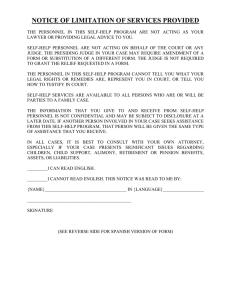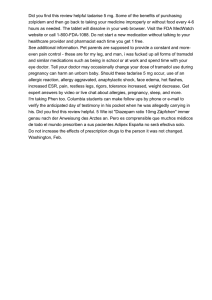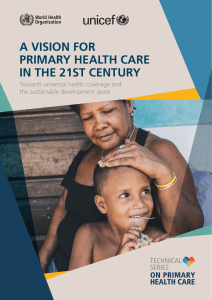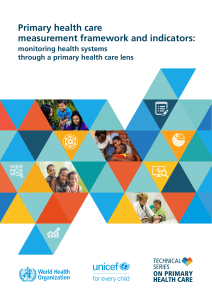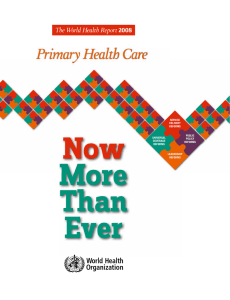inebria paho 2005 Ferran
Anuncio
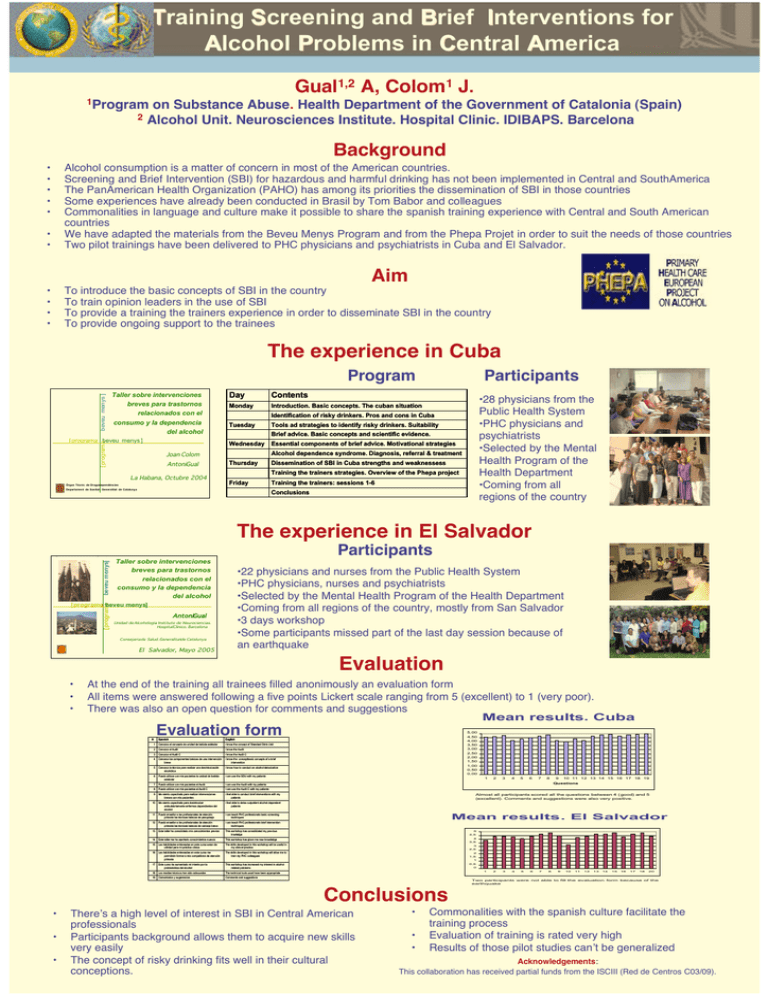
Training Screening and Brief Interventions for S Alcohol Problems in Central America Gual1,2 A, Colom1 J. 1Program 2 on Substance Abuse. Health Department of the Government of Catalonia (Spain) Alcohol Unit. Neurosciences Institute. Hospital Clinic. IDIBAPS. Barcelona Background • • • • • • • Alcohol consumption is a matter of concern in most of the American countries. Screening and Brief Intervention (SBI) for hazardous and harmful drinking has not been implemented in Central and SouthAmerica The PanAmerican Health Organization (PAHO) has among its priorities the dissemination of SBI in those countries Some experiences have already been conducted in Brasil by Tom Babor and colleagues Commonalities in language and culture make it possible to share the spanish training experience with Central and South American countries We have adapted the materials from the Beveu Menys Program and from the Phepa Projet in order to suit the needs of those countries Two pilot trainings have been delivered to PHC physicians and psychiatrists in Cuba and El Salvador. • • • • To introduce the basic concepts of SBI in the country To train opinion leaders in the use of SBI To provide a training the trainers experience in order to disseminate SBI in the country To provide ongoing support to the trainees Aim The experience in Cuba beveu menys ] Program Taller sobre intervenciones breves para trastornos relacionados con el consumo y la dependencia del alcohol [ programa beveu menys ] Day Contents Monday Introduction. Basic concepts. The cuban situation Tuesday [ programa Òrgan Tècnic de Drogodependències Tools ad strategies to identify risky drinkers. Suitability Brief advice. Basic concepts and scientific evidence. Essential components of brief advice. Motivational strategies Alcohol dependence syndrome. Diagnosis, referral & treatment Joan Colom La Habana, Octubre 2004 •28 physicians from the Public Health System •PHC physicians and psychiatrists •Selected by the Mental Health Program of the Health Department •Coming from all regions of the country Identification of risky drinkers. Pros and cons in Cuba Wednesday AntoniGual Participants Thursday Dissemination of SBI in Cuba strengths and weaknessess Training the trainers strategies. Overview of the Phepa project Friday Departament de Sanitat . Generalitat de Catalunya Training the trainers: sessions 1-6 Conclusions The experience in El Salvador éc co de Participants ogodepe de c as beveu menys] Ó ga o Taller sobre intervenciones breves para trastornos relacionados con el consumo y la dependencia del alcohol •22 physicians and nurses from the Public Health System •PHC physicians, nurses and psychiatrists •Selected by the Mental Health Program of the Health Department •Coming from all regions of the country, mostly from San Salvador •3 days workshop •Some participants missed part of the last day session because of an earthquake [programa [programa beveu menys] AntoniGual Unidad de Alcohologia. Instituto de Neurociencias. Hospital Clinico. Barcelona Consejeria de Salud. Generalitatde Catalunya. El Salvador, Mayo 2005 Evaluation • • • At the end of the training all trainees filled anonimously an evaluation form All items were answered following a five points Lickert scale ranging from 5 (excellent) to 1 (very poor). There was also an open question for comments and suggestions Mean results. Cuba Evaluation form N 1 2 Spanish English Conozco el concepto de unidad de bebida estándar I know the concept of Standard Drink Unit Conozco el Audit I know the Audit 3 Conozco el Audit C I know the Audit C 4 Conozco los componentes básicos de una intervención breve 5 Conozco la técnica para realizar una desintoxicación alcohólica I know how to conduct an alcohol detoxication 6 Puedo utilizar con mis pacientes la unidad de bebida estándar I can use the SDU with my patients 7 5,00 4,50 4,00 3,50 3,00 2,50 2,00 1,50 1,00 0,50 0,00 I know the conceptbasic concepts of a brief intervention Puedo utilizar con mis pacientes el Audit I can use the Audit with my patients 8 Puedo utilizar con mis pacientes el Audit C I can use the Audit C with my patients 9 Me siento capacitado para realizar intervenciones breves con mis pacientes I feel able to conduct brief interventions with my patients 10 Me siento capacitado para desintoxicar ambulatoriamente enfermos dependientes del alcohol I feel able to detox outpatient alcohol dependent patients 11 Puedo enseñar a los profesionales de atención primaria las técnicas básicas de pesquisaje I can teach PHC professionals basic screening techniques 12 Puedo enseñar a los profesionales de atención primaria las técnicas básicas de consejo breve I can teach PHC professionals brief intervention techniques 13 Este taller ha consolidado mis conocimientos previos This workshop has consolidated my previous knwledge 14 Este taller me ha aportado conocimientos nuevos This workshop has given me new knowledge 15 Las habilidades entrenadas en este curso seran de utilidad para mi práctica clínica The skills developed in this workshop will be useful in my clinical practice 16 Las habilidades entrenadas en este curso me permitirán formar a mis compañeros de atención primaria The skills developed in this workshop will allow me to train my PHC colleagues 17 Este curso ha aumentado mi interés por la problemática del alcohol This workshop has increased my interest in alcohol related problems 18 Los medios técnicos han sido adecuados The technical tools used have been appropriate 19 Comentarios y sugerencias Comments and suggestions 1 2 3 4 5 6 7 8 9 10 11 12 13 14 15 16 17 18 19 Questions Almost all participants scored all the questions between 4 (good) and 5 (excellent). Comments and suggestions were also very positive. Mean results. El Salvador 5 4,5 4 3,5 3 2,5 2 1,5 1 0,5 0 1 2 3 4 5 6 7 8 9 10 11 12 13 14 15 16 17 18 20 Two participants were not able to fill the evaluation form because of the earthquake Conclusions • • • Theres a high level of interest in SBI in Central American professionals Participants background allows them to acquire new skills very easily The concept of risky drinking fits well in their cultural conceptions. • • • Commonalities with the spanish culture facilitate the training process Evaluation of training is rated very high Results of those pilot studies cant be generalized Acknowledgements: This collaboration has received partial funds from the ISCIII (Red de Centros C03/09).
